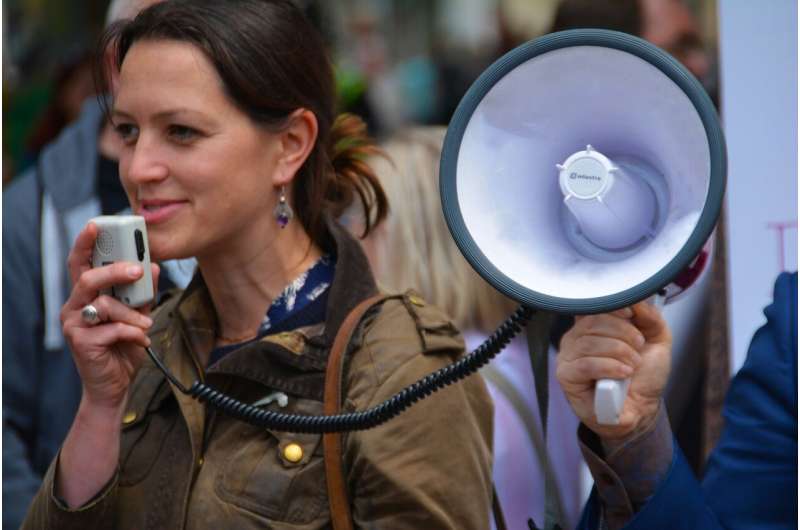It takes more than mass protests to drive change

Those large-scale protests on everything from climate change to wealth inequality make for engaging news segments. But do they result in real change?
That's a question Sarah A. Soule of Stanford Graduate School of Business wanted to examine as part of her ongoing research on social movements.
"In the social movement literature and more broadly, people pay more attention to public activities, such as mass protest events or petitions," says Soule, a professor of organizational behavior at Stanford GSB. "But they don't usually think about the professional, behind-the-scenes role that social movement organizations can play in helping shape legislators' thinking about policy."
In this context, Soule and her coauthor, Scott Ganz of Georgia Tech, studied environmental social movement or advocacy organizations that testified before Congress. As an example, she points to the 2011 hearings by the House Committee on Natural Resources on legislation regarding the conservation of such species as tigers, rhinos, apes, and turtles. The committee invited four environmental organizations, including the Dian Fossey Gorilla Fund International and Safari Club International, to provide specialized testimony on the topic.
In a study examining 26 years of records of congressional hearings—including the one above—Soule and Ganz showed that environmental movement organizations use two separate channels to wield significantly more political influence than other interest groups. First, they heighten lawmakers' awareness of what matters to their constituents, then they provide specific policy expertise on those issues.
Insights into Influence
The researchers were interested in two questions: how social movement organizations exert influence on policymaking through their expertise and how that level of influence compares to that of other types of advocacy groups.
Among social organizations, the researchers chose to focus specifically on environmental groups. "This is an area in which social movement organizations have been very active serving as expert witnesses to help craft policy," Soule says, "as opposed to focusing efforts on protesting in the streets."
To study organizational influence, the researchers collected data on every congressional hearing related to species and forest protection in the House of Representatives from 1988 through 2014. They paid close attention to the nature of the organizations invited to testify. "We had to identify whether they were an advocacy group, as we define it, or something else such as a labor union or professional organization," Soule says.
Beyond understanding which groups made it to congressional hearings in general, Soule and Ganz examined the specific types of hearings on which a given type of organization had influence. "In the beginning of the legislative process," Soule says, "when legislators are trying to figure out what constituents care about, they may pay attention to mass protests, for example, to understand public opinion, as a sort of informational signal." Protests typically influence which issues the lawmakers will choose to address and eventually how they will vote on proposed legislation.
But there are multiple points between those two phases, most notably the crafting of legislative language. At that stage, they may call on social movement organizations for expert information, such as which nature preserves or species require the most urgent protection.
Soule's research uncovered the importance of social movement organizations in both the investigatory (deciding what issues the public cares about) and policy-crafting (deciding how to address those issues) phases of the legislative process.
The study found that social movement organizations exert more influence during the later stages of policymaking than do other types of interest groups. Legislators appear to see social movement groups, due to their scientific expertise and perceived legitimacy, as offering higher-quality inputs than other organizations do.
Seek a Seat at the Table
Soule's research has multiple implications for stakeholders in the legislative process.
"Our finding that social movement organizations offer valuable policy-related expertise probably isn't shocking for legislators," Soule says, "because they're the ones deciding who gets to testify on an issue in the first place." But she notes that lawmakers might be surprised by the strength of these groups' influence on policymaking when compared with those representing other interests.
More important are the implications for social movement organizations themselves, as they think about how best to effect change. "With the rise of the internet," Soule says, "modern movements can mobilize constituents through their websites and social media. If your end goal is to get 500,000 people to turn up on the Mall in Washington, D.C., Twitter is great at that. Facebook is great at that. But if your goal is to actually make lasting change in the system, you have to work within the system—to essentially get a seat at the table."
"Occupy Wall Street," she continues, "mobilized a lot of people and got a key point across about income inequality in the U.S. But did it result in real change? Unfortunately, no. Had there been a nice set of organizations able to get access to the political and economic system that the movement criticized, the changes may have been more enduring."
More information: Scott C. Ganz et al. Greening the Congressional record: environmental social movements and expertise-based access to the policy process, Environmental Politics (2019). DOI: 10.1080/09644016.2019.1565463
Provided by Stanford University



















